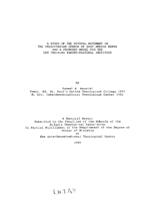- Collection:
- Interdenominational Theological Center Theses & Dissertations Collection
- Title:
- A study of the Revival Movement in the Presbyterian Church of East Africa Kenya and a proposed model for the Lay Training Kikuyu Pastoral Institute, 1985
- Creator:
- Mwaniki, Samuel M.
- Date of Original:
- 1985-05-11
- Subject:
- Dissertations, Academic
Degrees, Academic - Location:
- United States, Georgia, Fulton County, Atlanta, 33.749, -84.38798
- Medium:
- theses
- Type:
- Text
- Format:
- application/pdf
- Description:
- This study is focused on the Presbyterian Church of East Africa in relationship to the East African Revival Movement in Kenya. The study and model have been made necessary because of the current misunderstandings, if not confusion, among the believers. This confusion not only has created misunderstanding among the members but also has affected the church leadership. The situation is worsening because of the lack of adequate and effective teachings as well as understanding of the Revival Movement's background and its roots. This project will provide the necessary tools to enable the church to resolve some of the current problems, in part caused by the misunderstanding of the theological factors presently experienced in the P.C.E.A. church. An attempt will be made to identify the roots of the problems in the recent situation and to assist in the remedy. The material will lay the foundation for the future study of the Revivalist Movement in the Presbyterian church--inter-relading the church and society. Eventually, this model will be a great help to the church leaders, guiding them in both future research and programmatic implementation. Prolific members of independent church movements emerged from the political independent groups seeking their own identity. The author of this study has sensed the necessity for limiting this study to the predominantly Revivalistic Movement in the Presbyterian Church of East Africa in Kenya known as the East Africa Revival Fellowship. Primary justification for the selection of this movement rests in the extent to which it has affected and revived the Presbyterian Church of East Africa in Kenya. The present study is not concerned with revivalism as a series of religious group principles, nor as a tool for the polemicist to utilize the versatility of the term. The writer considered this movement as a unique type of revivalist, because it represented a system of ideas concerned with reviving religious and social values of the African Christianity. It is unique because it cannot stand alone as a self-contained, normative system. It stands in relationship to the Christian faith seeking to fulfill and conserve the teaching of our Lord Jesus Christ. The study is made of the periods during Pre-independence (1930-1950) and post independence (1963-1984). The fundamental purpose of this project, then, is to study and evaluate the basic tenets of the Revival Movement. The reason for studying this particular spiritual movement is its short span which has attracted many Protestants and Roman Catholic Church members. This movement became energetic after political independence in Kenya in 1963. It has witnessed an ever-increasing growth in the church. Many church members and leaders openly proclaim themselves as members of this movement, by claiming an experience of new conversion. The methodology used in this study include the following aspects: (a) Exposes the foundations upon which the basic philosophy of the Revivalistic movement has been built politically, socially, economically and religiously (theologically). (b) Examines the deviation from missionary-led churches. (c) Analyzes the dissenting elements. (d) Appraises the Revivalistic movement. (e) Presentation of a general summary and conclusion of the findings of this study. Sources of Material and Tools of Research The materials to be used in this study have been obtained from the Atlanta University Library; Emory University Library; Atlanta Public Library; Presbyterian Church of East Africa-Kenya; publisher-Nairobi University of Nairobi; African writers; and personal experiences of the writer in the Presbyterian church as pastor. Various resources utilized in the above sources include books, periodicals, encyclopedia, and newsletters from East Africa Churches. Significance of Study. This study would be of minor significance to the reader desiring a thorough knowledge of the subject. It should be of major significance for one seeking an analytical compendium of the Revivalist movement in Presbyterian Church of East Africa-Kenya, and some descriptions and problems facing the revivalistic movement in Presbyterian Church of East Africa.
Date of award: 1985-05-11
Degree type: dissertation
Degree name: Doctor of Ministry (DMin)
Granting institution: Interdenominational Theological Center - Metadata URL:
- http://hdl.handle.net/20.500.12322/itc.td:1985_mwaniki_samuel_m
- Holding Institution:
- Interdenominational Theological Center (Atlanta, Ga.)
- Rights:
-
